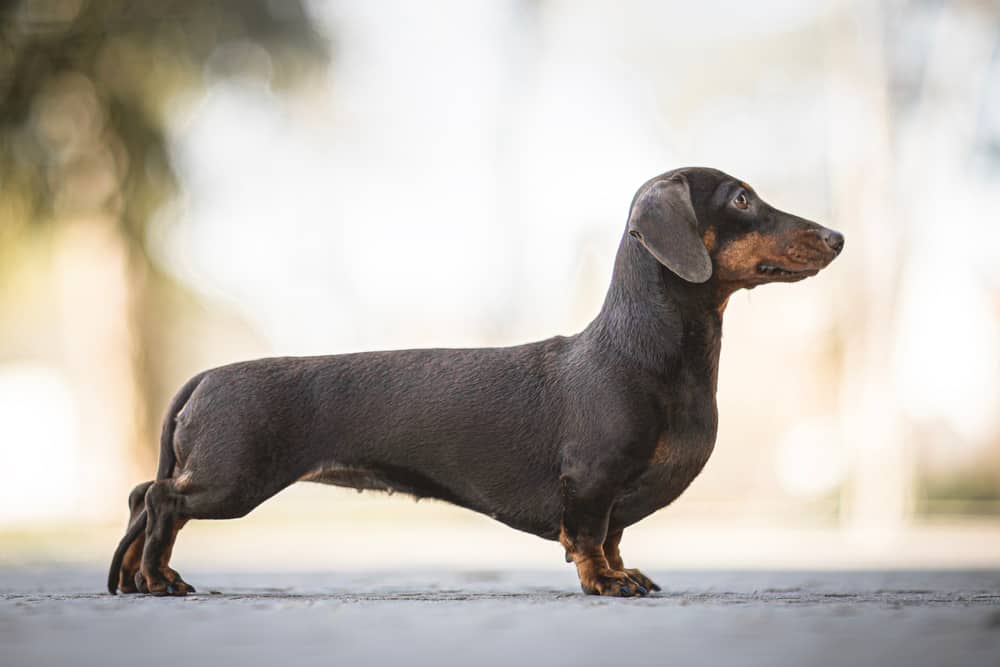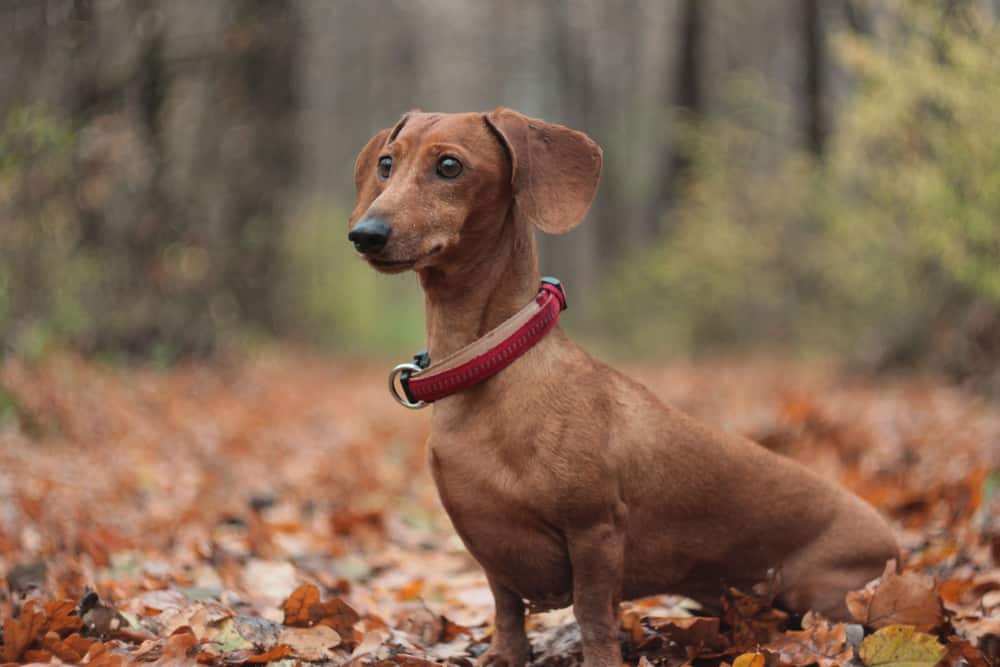Dachshund
“Was my Dachshund too skinny?” is a question that keeps on haunting me ever since I was the owner of an adorable Dachshund a few years ago. I showered him with love and gave him the best dog food money could buy, but unexplainably, he just wouldn’t gain any weight. Throughout his tail-wagging nine years with our family, he stayed extremely skinny.
The ideal weight for a standard adult Dachshund is usually between 16 and 32 pounds while for an adult miniature it’s 11 pounds and under. The cause of being underweight can be anything from an underlying illness, wrong diet, or simply because the dog is a picky eater. It is extremely important that your Dachshund maintains an ideal body weight in order to avoid any serious health issues.
We all want the best for our dogs, right? So, how do we determine whether they are happy, healthy, and not underweight?
How to determine whether your Dachshund is underweight
An underweight dog is a hungry and unhappy dog. I think we can all agree that an unhappy dog makes for an unhappy owner. If your standard adult Dachshund weighs less than 16 pounds, there are various questions you can ask yourself in determining whether your dog is indeed underweight:
- Are its spine, ribs, and hip bones clearly visible?
- Are body fat and muscle mass evident?
- Can you see clear protruding bones at the base of its tail?
- Is there a sharp narrowing between the back of the rib and the hips?
If you’ve answered “yes” to more than two of the above questions, your four-legged friend probably does not have an ideal body weight.
Why would your Dachshund get or stay too skinny?
There are various reasons why a Dachshund can get or stay too skinny.
One alarming reason why a Dachshund can get skinny is that it can develop an illness or health issue. Three of the most common health issues in the Dachshund’s generic pool are cancer, back problems and dental issues.
Another reason why your Dachshund can get too skinny is because of stress-related environmental changes. Dogs become extremely attached to their environments. Therefore, moving house can be equally stressful for dogs and their owners.
Our four-legged friends are sensitive mammals, and not getting enough love or attention might cause them to act out.
Old age is another reason why your Dachshund might be losing weight. Luckily, there are some great nutritional supplements on the market that were especially created to relieve age-related symptoms.
Whatever the reason for your Dachshund’s skinniness, there is a possibility of some or other alarming health issues on the horizon.
What are the health issues associated with an underweight Dachshund?
There are various health issues associated with an underweight Dachshund. These conditions need to be diagnosed and treated as soon as possible so that you can prolong the life of your four-legged friend. Some of the most common health problems are as follows:
- Weakening of the immune system
- Susceptibility to infections
- Skin and coat problems
- Infertility
- Muscle loss
- Hormonal imbalances
- Diseases
- Loss of appetite
Don’t be alarmed by all these health risks as there are various steps you can take to help your dog become happy and healthy once again.

What to do if your Dachshund is underweight
If your Dachshund seem underweight, there are various at-home solutions you might want to try before running to the vet.
One at-home solution is to pay more attention to his eating habits. Perhaps he eats better in the morning than in the evening. Something as simple as increasing his food in line with his metabolism might naturally increase his weight.
In addition to paying closer attention to his eating habits, you might also consider alternative feeding methods. Nowadays, there are great feeding alternatives on the market; one such alternative is the feeding ball, which combines playtime with feeding time. Some Dachshunds are more playful than others, and the feeding ball might be a great alternative to the boring food bowl while also increasing exercise and play.
If none of the above at-home solutions assist with your dog gaining weight, you should probably visit your nearest veterinarian. He/she will be able to confirm your suspicions and possibly prescribe medication for treating an underlying illness, or propose a change in diet that also involves adding certain supplements and vitamins.
What formula food is best to feed your underweight Dachshund?
A good diet for an underweight dog is formula food that is high in calories and protein. Protein supplies amino acids. These amino acids play a big role in ensuring that your dog’s coat, nails, ligaments, muscles, and tendons are all in the best condition. Some of the best dog food brands on the market are the following:
- Royal Canin
- Taste of the Wild
- ORIJEN
- Hill’s Science Diet
Your veterinarian will be able to assist you in determining which brand is the best for your Dachshund’s age and condition. The food prescribed by the veterinarian need not cost you an arm and a leg. Let’s have a look at your options:
How much will I pay for quality dog food?
To help your Dachshund on its way to reach a healthy weight, you are going to have to delve into your wallet. Are you one of those people who can buy whatever your heart desires, or are you, like me, muddling around somewhere in the middle?
It doesn’t matter as there is a healthy and affordable formula food around every corner. An average-size bag of perfectly nutritional mid-range dog food like Eukanuba, Authority, or Hill’s Science Diet will only cost you between $35 and $45. However, if you feel that your doggo deserves only the best money can buy, you are looking to cough up anything between $59 and $95 for a bag of top-of-the range premium dog food like Acana or Canidae PURE.
Apart from replacing your Dachshund’s formula food as prescribed by the veterinarian, there are various other supplements and snacks that will help your dog gain more weight.
What snacks and supplements can I feed my underweight Dachshund?
Apart from a change in food, here is a list of other possible solutions that will help your Dachshund gain weight:
- Bison is a great supplemental food that is high in fat and protein. You can feed your dog bison from time to time, but it should not replace the balanced formula prescribed by your veterinarian.
- Give your dog small meals throughout the day. This will allow your dog to consumer more calories, which in turn will help it to gain some weight.
- If your dog love snacks, never give him table scraps. Dachshunds are especially prone to barking and begging habits when they are used to receiving table scraps. Instead, give him healthy snacks like carrot sticks or grated apple. These veggie snacks are great sources of fiber and vitamins.
You can feed your dog all the snacks and supplements his little heart desires, but sometimes a skinny Dachshund is simply too skinny because he’s a picky eater.
Why are some Dachshunds picky eaters?
Some Dachshunds are underweight because they are picky eaters, and there is more than one reason why a Dachshund can be a picky eater.
Remember my point earlier about feeding your dog table scraps? Feeding table scraps is one of the main reasons why some Dachshunds become picky eaters. They become too spoiled in that they don’t want to eat anything else than table scraps. As a result, they start to lose weight as the table scraps alone are simply not enough to constitute a healthy diet.
Another reason why your Dachshund might be a picky eater, is that he is lonely or bored. For example, if your dog is constantly left home alone while you are out galivanting, he will become depressed and deprived of your love and attention. Be sure to smother your Sausage with love, playtime, and attention, and he might just start to devour those bowls filled with healthy and affordable formula food.
Apart from loneliness and boredom causing your Dachshund to be a picky eater, the reason for his pickiness might be as simple as him purely not enjoying the taste of his formula food. In this case, it’s an easy fix: simply try to feed him another equally healthy and balanced formula food. Perhaps he is more of a chicken lover than a meat lover.
Conclusion
Overall, there are different causes for your Dachshund being underweight. He can suffer from an underlying illness or a lack of food. Perhaps he is simply a picky eater or a senior citizen. There are various steps you can take in order to ensure that your skinny Sausage turns into a healthy Hound. Be sure to check on your Dachshund’s weight often and don’t ever share with him your chocolate!
